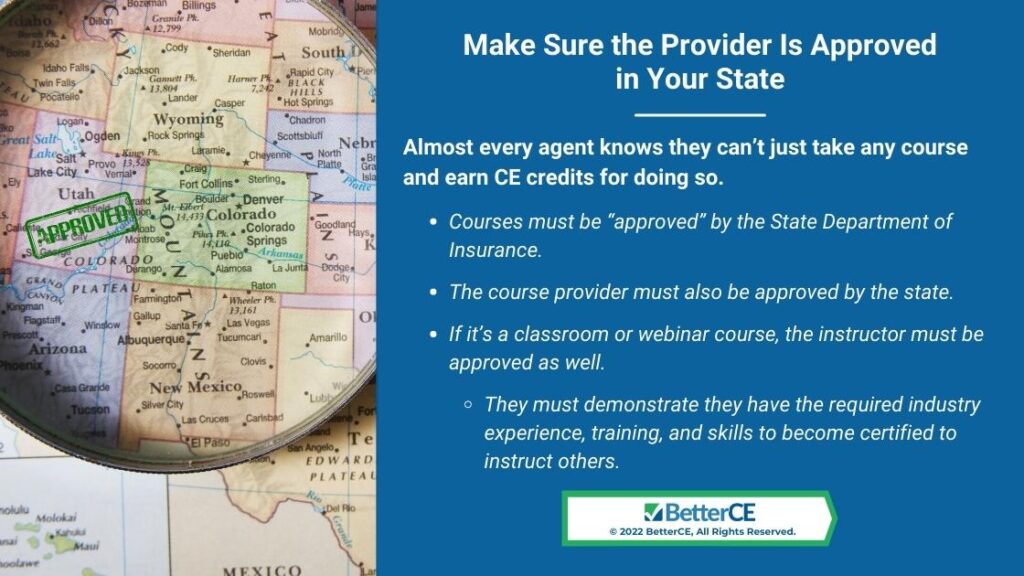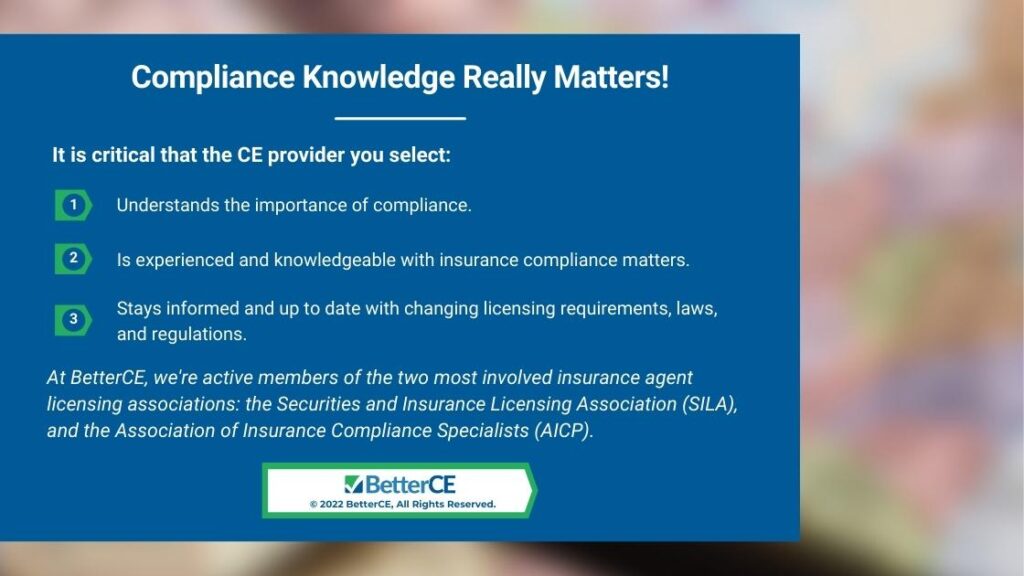Many insurance agents don’t give a lot of thought to who they use for their insurance continuing education provider. It’s something they know they have to get done and they assume all CE providers are pretty much the same, so why not just pick the cheapest option available from a google search? As you will soon learn, there are a lot of reasons doing this can be a big mistake.
This is your professional license – it took a lot of time and effort to earn and you don’t want to jeopardize it because of something an inexperienced provider failed to do correctly.
Make Sure the Insurance Continuing Education Provider is Approved in Your State
Almost every agent knows they can’t just take any course and earn CE credits for doing so. To be eligible for CE credits, courses must be “approved” by the State Department of Insurance in which you hold your resident license. But it’s not only the courses that must be approved. The provider offering the course must also be approved by the state.
And if it’s a classroom or webinar course, the instructor must be approved as well. And not just anyone can be a provider or instructor. In order to gain approval, they must demonstrate they have the required industry experience, training, and skills to become certified to instruct others.

We make it easy for you to know every course we offer is fully approved by your state’s department of insurance. We list our provider approval number on every state catalog page. For most states, we link to the state database where you can verify our provider status. In the description of each course, we also list the specific course approval number. And you’ll see our approved instructors listed for each webinar we offer on the webinar description page.
Compliance Knowledge Really Matters!
Insurance compliance is super complex! It takes years of experience to understand the laws, rules, regulations, and processes relating to licensing insurance agents. There is a myriad of rules and regulations that CE providers must meet in order to offer their courses.
But there is also a multitude of differing training requirements that agents must meet to be compliant with their CE requirements…and these requirements change frequently. And don’t forget that completing your CE Requirements doesn’t ensure that your license stays active. Your credits still need to be filed, and you will also need to complete and submit your renewal application before your expiration date.
So, it is absolutely critical that the insurance continuing education provider you select: 1) understands the importance of compliance, 2) is experienced and knowledgeable with insurance compliance matters, and 3) stays informed and up to date with changing licensing requirements, laws, and regulations.
Take, for example, the process of selecting the right courses to take. While most states require agents to complete 24 credits of CE every 2 years, many states have special requirements for the type of courses that must be taken. The most common of these is the “ethics training requirement”: all but a few states require agents to complete 3 hours of ethics training as part of the 24 credits required. But many states also have “license-type specific training requirements”.
These states require agents to take a certain amount (or all) of their courses in subject matters that are approved specifically to their type of license. For example, agents licensed in Life insurance may have to take all or a certain minimum number of courses that are approved specifically for Life insurance agents. Multi-lines licensed agents (2 or more lines of Property, Casualty, or Life and Health) may be required to take a specific number of credits for each license they hold.
Read more in our blog: A Guide to Insurance Continuing Education (CE) 2024

To add to this, many states have “product-specific” training requirements that must be taken by agents. Agents who sell certain types of insurance products are required to undergo initial, and in many cases, ongoing training for these types of products. This is the case in many states for agents who sell or solicit annuities or long-term care products. Not only must agents take an initial training course on these products (4 or 8 hours, usually), they must also take ongoing, or refresher courses on these products every 2 years.
The same is true in many states for agents who sell or solicit flood or homeowners insurance. Still, other states have special training requirements in the areas of law or legislative updates. In Florida, for example, agents are to complete a minimum of 5 hours of “law and ethics” training every 2 years.
At BetterCE we fully understand the importance and complexity of compliance matters because we were founded and still overseen by former insurance regulators and compliance experts. We have a deep understanding of the specific requirements and processes involved because we have overseen state insurance licensing divisions. We have also been involved in the development of licensing statutes, rules, and regulations – at both the state and national level through our involvement with the National Association of Insurance Commissioners (NAIC).
We know how important it is to stay on top of regulatory changes, so we’re active members of the two most involved associations dealing with insurance agent licensing concerns: the Securities and Insurance Licensing Association (SILA), and the Association of Insurance Compliance Specialists (AICP).
Filing Your CE Credits is a Huge Deal!
Imagine if you have paid for your courses and spent the time to complete them, but when you go to renew your license you find out that your credits haven’t been reported by your CE provider! Or even worse, you get a letter from your Department of Insurance that your license is no longer active because you didn’t complete your CE requirements. Almost all states charge late fees to have your license reinstated, and these fees can range anywhere from $15 to $500. And if you go beyond the allowable reinstatement period, you may even have to go back through the process of relicensing!
While filing CE credits may seem like a simple process, it is something that requires incredible organizational skills and attention to detail. This is especially true if your insurance continuing education provider operates in multiple states.
There is so much that can go wrong with reporting CE credits, that it is no surprise how frequently our office receives calls from frustrated agents who are seeking our help (or signing up to take replacement courses) in determining why their prior CE provider has not filed the credits they earned. The most common reason this occurs is that the CE provider didn’t gather the correct license information from the licensee, or the provider mistyped it when trying to submit the credits. In other cases, the CE provider may have slow internal processes, and they take days, or even weeks to submit student credits.

With BetterCE you can rest assured that your credits will be filed timely and accurately. We’ve invested in and developed multiple proprietary systems and processes for ensuring every credit earned is reported accurately and timely. We confirm your license information is accurate prior to submitting them and undertake several post-submission audits to verify the records were accepted and applied properly to the agent’s account with the state. In addition, we file your credits the same day as you complete each course and send you an email notifying you of such. The email also contains a link you can use to verify that your credits have been reported to the state.
The BetterCE Difference
We understand that completing coursework is just one of the steps required towards the ultimate goal: keeping your insurance license active. So, all of our products and services are designed, not only to help you learn but to keep you compliant. Our Complete Compliance Packages make course selection super easy, and you can rest assured they contain every course you need for your specific training requirements.
Our course catalog pages have all of the resources you need to easily manage your license: you can check your license status, view your CE requirements, access your CE transcript, and renew your license using the resources we provide. Your course dashboard shows you exactly how many credits you are enrolled for, and how many you’ve earned.
And when you’re done with each course, we submit your credits to your department of insurance the same day as you complete them. But we don’t stop there. For each credit submission we report, we send you an email notification that includes our Next Step Reminder – specific guidance and instructions on what additional steps need to be taken to complete the license renewal process.



